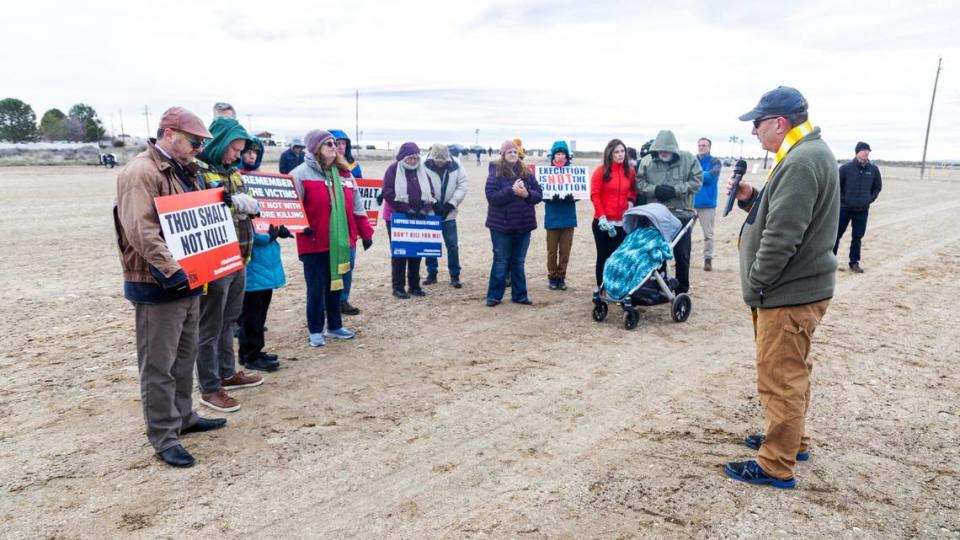Idaho death row prisoner secures stay of execution, alleges cruel and unusual punishment
- Oops!Something went wrong.Please try again later.
Immediately following the Idaho prison system’s failure Wednesday to execute the state’s longest-serving death row prisoner by lethal injection, his attorneys secured a stay of execution from a federal judge and filed a new demand they said was intended to protect their client’s constitutional rights.
U.S. District Court Judge Amanda Brailsford for the District of Idaho issued a stay of execution for Thomas Creech about a half-hour after Idaho Department of Correction officials called off his lethal injection when they couldn’t locate a vein for an IV. Attorneys for the prison system did not contest the emergency request for the stay from Creech’s attorneys, who alleged in their court filing that the execution team had “badly botched” their client’s lethal injection Wednesday morning.
Creech’s attorneys wrote that they were not aware at the time of their filing whether the prison system would again try to execute their client during his active death warrant, which expired at the end of the day Wednesday. IDOC Director Josh Tewalt said during a Wednesday afternoon press conference that the prison system decided not to make another attempt to execute Creech.
On Thursday during testimony before an Idaho House committee, Tewalt contested claims that Creech’s execution, while unsuccessful, was botched. In fact, he said, the lethal injection policies and procedures worked as intended.
“Unequivocally, they made the right call,” Tewalt said of the execution team. “The worst thing the state could have done is to try to proceed with an execution without having confidence or the ability to administer those chemicals in a way that honored our commitment and responsibility to adhere to the Eighth Amendment and preventing cruel and unusual punishment.”
Tewalt and media witnesses said the execution team tried eight times to find a vein in different areas of Creech’s body over about an hour. The execution team’s failure to carry out a lethal injection “proves IDOC’s inability to carry out a humane and constitutional execution,” Creech’s attorneys wrote.
A new death warrant — what would be the 13th for Creech since he was convicted of murder for the November 1974 shooting deaths of two men in Valley County — would need to be issued if prison officials were to attempt to execute him again. Creech, 73, has been incarcerated in Idaho for nearly 50 years, the bulk of that time on death row.

Talk of firing squad back at the Capitol
Creech’s attorneys with the legal nonprofit Federal Defender Services of Idaho argued in their court filing that their client’s constitutional rights may have been violated during Wednesday’s execution attempt. They issued a legal demand that the prison system preserve all evidence and that the execution chamber be kept in its present condition. They sought to inspect and photograph the chamber, and immediately speak with their client.
“This motion is based on Mr. Creech’s right to an execution free from cruel and unusual punishment under the Eighth Amendment,” wrote Creech’s attorneys in a case that named Tewalt, Idaho maximum security prison Warden Tim Richardson and IDOC prisons chief Chad Page as the defendants.
Members of the Idaho attorney general’s office objected on their behalf in a response filing, arguing that Creech’s attorneys had not stated a viable legal claim. They asked that Brailsford reject the request.
“While (the) plaintiff cites the Eighth Amendment, the motion does not contain any legal or other authoritative source citations to support plaintiff’s requests that IDOC preserve ‘evidence’ and the execution chamber,” the prison officials’ attorneys said.
Brailsford held a Wednesday afternoon conference call with attorneys from both sides to discuss the emergency demand, according to the court docket. The judge during the call reminded each side of their responsibility to preserve information they believe could be relevant in a future lawsuit.
Brailsford found the emergency demand to be moot, the docket stated, after attorneys for Creech and the prison system reached agreement during the call on each of the three requests in the legal demand. The terms of that compromise were not immediately clear.
Creech was returned to his cell after prison officials called off the execution, prison officials said. Tewalt said that state officials are considering what they may do next. Reviewing how soon they can potentially implement the firing squad, which Idaho approved last year as its backup execution method, is part of those discussion, he said Thursday.
“The math we’re doing is: Can it be done in a way befitting what this process deserves, as well as controlling as many variables as possible?” he told the House committee. “We continue to try to work through that process of where, best and how to carry that out.”

